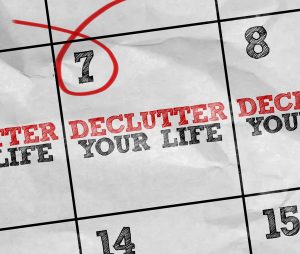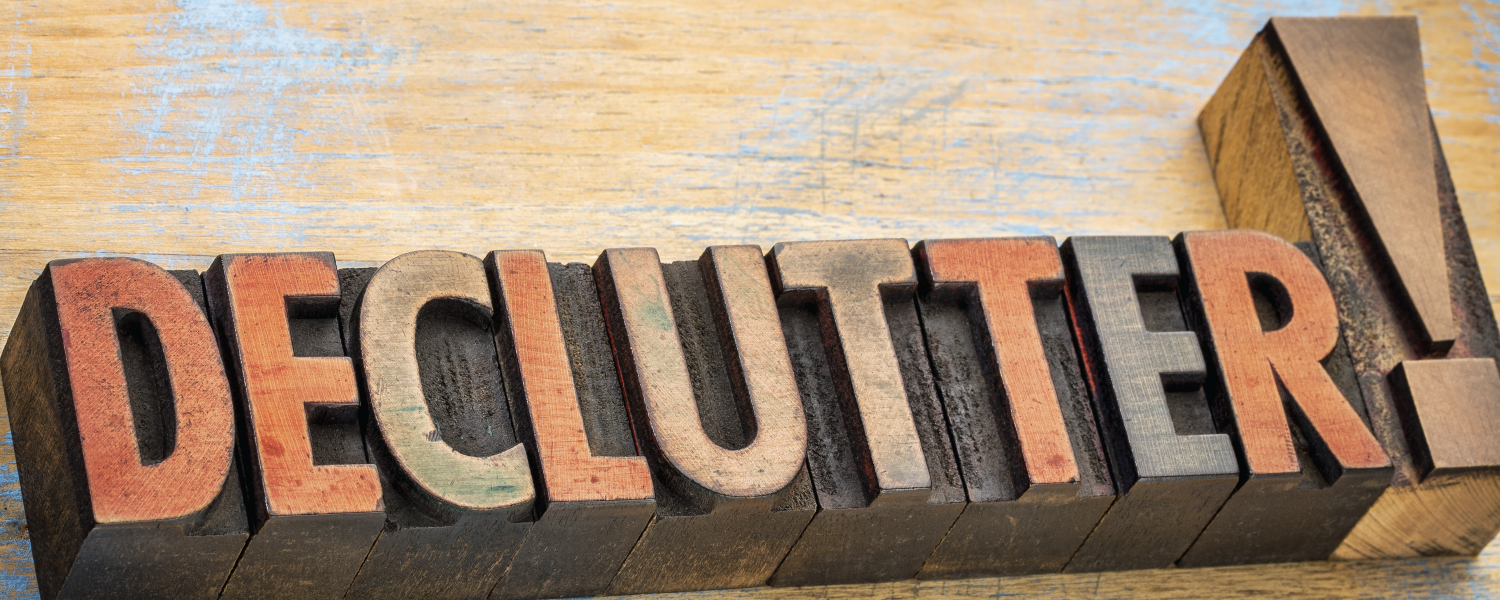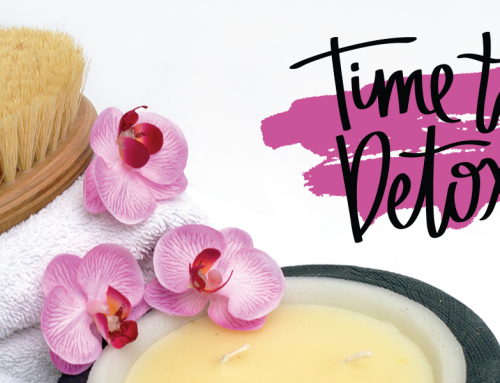Look around you. How much “stuff” have you accumulated over the years that you do not need for your imminent survival?
Some items may have been purchased because they were on sale or the advertisement promised an amazing benefit that just wasn’t so. Some things used to serve a purpose, but now they just collect dust. Some items are kept for sentimental value, and others you don’t even notice anymore, because they have been there for so long.

But how does all of this clutter make you feel? It adds chaos to your every day life, because it is not visually appealing to look at and this stuff tends to just be in the way.
What about the clutter taking over your office space? This can cause added stress to already crazy days, because there is no space to work or brainstorm or spread out a notebook for fresh ideas. This adds more stress than is necessary and can really affect how you feel by the time you head home (to more clutter!)
“UCLA’s Center on Everyday Lives and Families (CELF) explored the relationship between 32 families and the thousands of objects in their homes and concluded that clutter has a strong effect on mood and self-esteem. Women were particularly stressed out by the presence of clutter. In fact, according to the CEFL study, the amount of stress they experience at home is directly proportional to the amount of stuff they and their family have accumulated. Similar to multitasking, physical clutter overloads your senses, makes you feel stressed, and impairs your ability to think creatively.”1

What is the solution??
It’s time to start giving away some of the items you know that you will never use again, haven’t used in months, or never really liked in the first place.
Here are two questions to ask yourself when beginning the task of decluttering:
Does it bring me joy?
Does it serve a functional purpose?
If you answered no to either of these questions, out it goes!!
The best way to get rid of your items is to donate them to others who might be in need of your things. Then you can feel as though the money that you spent on various items isn’t going into the garbage (and filling up our landfills) but that someone else might benefit from your generosity. For example, find a Goodwill, Value Village, Salvation Army, Women and Children’s shelter, or similar, to donate your gently used items to.

Here is a great way to ease yourself into getting rid of some clutter:
Over the course of a few weeks, you can really pare down your excess belongings by subscribing to this activity:
Day 1: Get rid of one item (it can be just one shirt, or one small appliance, one pair of shoes or a Christmas decoration you haven’t used in years).
Day 2: Get rid of two items!
Day 3: Get rid of three items!
…until you get to Day 30, and you rid yourself of 30 items that are cluttering up your space. Choose items that do not bring you joy and/or no longer serve a functional purpose!
Other ways to declutter:
• you can sell items online
• have a garage sale
• swap items with your friends
Make it fun! Getting rid of clutter doesn’t have to be traumatic, but it can sometimes feel stressful because we worry that we’ll need something again in the future and won’t have it. Start slowly on Day 1, and you will begin to feel a sense of lightness and excitement when you can see a bit more living space coming into view, not to mention your good deeds of donating your goods to someone who may get more joy from them than you do.

With Sources From:
1 – http://bebrainfit.com/declutter-stress-health/
____________________________________
Jo-Anne Richardson, Registered Holistic Nutritionist & Energy Medicine Practitioner
Jo-Anne works with Fournier disAbility & Health Management Solutions to provide online education for clients and patients. Her interest in healthy, joyful living is demonstrated in her writing, coaching and teaching. Her goal is to improve the health of her community by empowering you with knowledge, support and new ideas.
Looking for more tips and information on holistic health and living? Like our Facebook page at https://www.facebook.com/FournierHealth and follow us on Twitter https://twitter.com/FournierHealth
____________________________________

Lucie M.H. Fournier RN, COHN(C), BA (Psych)
Founder/Workplace Health Strategist
With over 30 years of experience in disability management, and a return on investment on average of 1:7, Fournier disAbility & Health provides customized and results oriented services in Absenteeism Management including Attendance, Sick Time/Short, Long Term Disability, and WSIB claims for employers across Ontario.
Expertise in 3 distinct niches of disAbility management include:
1. Complex claims management resolution
2. Mental health claim return to work & accommodations
3. Advanced level training for internal claims manager to make a significant impact on the health of the employee and wealth of the organization
4. Transitional Leadership when moving to & from a 3rd party disAbility Management company
5. Sensitive claims & disAbility management of professional staff, such as HR, health team, and/or executives such as supervisors, managers, directors






Leave A Comment